#Divine genealogies
Explore tagged Tumblr posts
Text
"Unveiling the Mystique of Antiquity: A Journey Through 'The Myths and Legends of Ancient Greece and Rome' by E. M. Berens"

In the realm of classical mythology, E. M. Berens' "The Myths and Legends of Ancient Greece and Rome" stands as a venerable guide, beckoning readers into the enchanting tapestry of gods, heroes, and timeless tales. As I embarked on this literary odyssey, I found myself captivated by the author's adept storytelling and his ability to breathe life into the ancient narratives, making them accessible and engaging for a contemporary audience.
Berens' comprehensive exploration begins with the origins of the Greek and Roman pantheons, tracing the lineage of deities and the epic events that shaped their divine realms. The book then unfurls a rich tableau of myths, ranging from the birth of the cosmos to the heroic exploits of figures like Hercules, Perseus, and Odysseus. Each narrative is meticulously crafted, with Berens providing insightful commentary that delves into the symbolic and cultural significance of these tales.
What sets Berens' work apart is his knack for blending academic rigor with a storyteller's flair. He navigates the intricate genealogies and complex relationships of the gods with clarity, ensuring that readers, whether well-versed in classical mythology or newcomers to the subject, can easily follow the intricate narratives. The prose is eloquent, evoking the grandeur of ancient civilizations while maintaining a modern accessibility that makes the myths feel vibrant and relevant.
One of the standout features of the book is Berens' meticulous attention to detail. He not only recounts the well-known myths but also unearths lesser-known stories, providing a holistic view of the ancient mythological landscape. The inclusion of lesser-known tales adds depth to the reader's understanding, creating a nuanced portrayal of the diverse characters and themes that populate the classical mythos.
"The Myths and Legends of Ancient Greece and Rome" also serves as a valuable cultural resource, shedding light on the moral and philosophical underpinnings of these ancient societies. Berens explores how these myths were interwoven into the fabric of daily life, shaping religious practices, artistic expressions, and even political ideologies. This contextualization enriches the reader's appreciation for the enduring impact of classical mythology on Western culture.
While Berens' work is undoubtedly a comprehensive and illuminating resource, it is not without its limitations. The book, originally published in the late 19th century, reflects the perspectives and biases of its time. Some readers may find aspects of the text to be outdated or culturally insensitive. Additionally, the absence of in-depth analysis or critical engagement with the source material may leave scholars wanting more scholarly depth.
In conclusion, "The Myths and Legends of Ancient Greece and Rome" by E. M. Berens is a captivating journey through the timeless narratives of classical mythology. Berens' storytelling prowess, coupled with his dedication to presenting a comprehensive overview, makes this book a valuable companion for anyone seeking to explore the rich tapestry of ancient Greek and Roman myths. The author's ability to strike a balance between academic rigor and engaging storytelling ensures that this work remains an enduring classic in the realm of mythological literature.
E. M. Berens' "The Myths and Legends of Ancient Greece and Rome is available in Amazon in paperback 16.99$ and hardcover 23.99$ editions.
Number of pages: 422
Language: English
Rating: 9/10
Link of the book!
Review By: King's Cat
#Ancient Greek mythology#Roman mythology#Classical legends#Mythological pantheon#Gods and goddesses#Heroes and heroines#Mythical narratives#Epic tales#Greek and Roman deities#Mythological stories#Berens' mythology#Ancient epics#Mythical characters#Classical literature#E. M. Berens myths#Mythological retellings#Legendary adventures#Divine genealogies#Classical civilization#Mythological symbolism#Cultural significance#Moral themes#Philosophical concepts#Mythological interpretations#19th-century literature#Ancient cosmogony#Mythical creatures#Heroic exploits#Classical deities#Greek and Roman folklore
6 notes
·
View notes
Text
"Unveiling the Mystique of Antiquity: A Journey Through 'The Myths and Legends of Ancient Greece and Rome' by E. M. Berens"
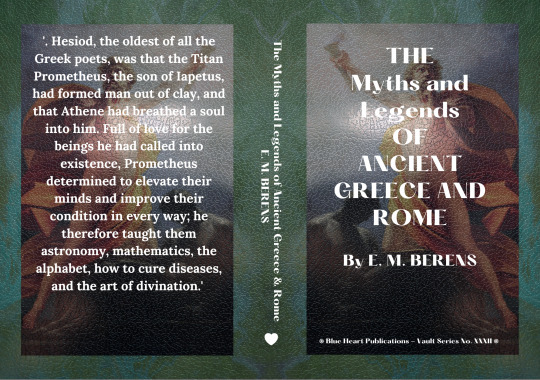
In the realm of classical mythology, E. M. Berens' "The Myths and Legends of Ancient Greece and Rome" stands as a venerable guide, beckoning readers into the enchanting tapestry of gods, heroes, and timeless tales. As I embarked on this literary odyssey, I found myself captivated by the author's adept storytelling and his ability to breathe life into the ancient narratives, making them accessible and engaging for a contemporary audience.
Berens' comprehensive exploration begins with the origins of the Greek and Roman pantheons, tracing the lineage of deities and the epic events that shaped their divine realms. The book then unfurls a rich tableau of myths, ranging from the birth of the cosmos to the heroic exploits of figures like Hercules, Perseus, and Odysseus. Each narrative is meticulously crafted, with Berens providing insightful commentary that delves into the symbolic and cultural significance of these tales.
What sets Berens' work apart is his knack for blending academic rigor with a storyteller's flair. He navigates the intricate genealogies and complex relationships of the gods with clarity, ensuring that readers, whether well-versed in classical mythology or newcomers to the subject, can easily follow the intricate narratives. The prose is eloquent, evoking the grandeur of ancient civilizations while maintaining a modern accessibility that makes the myths feel vibrant and relevant.
One of the standout features of the book is Berens' meticulous attention to detail. He not only recounts the well-known myths but also unearths lesser-known stories, providing a holistic view of the ancient mythological landscape. The inclusion of lesser-known tales adds depth to the reader's understanding, creating a nuanced portrayal of the diverse characters and themes that populate the classical mythos.
"The Myths and Legends of Ancient Greece and Rome" also serves as a valuable cultural resource, shedding light on the moral and philosophical underpinnings of these ancient societies. Berens explores how these myths were interwoven into the fabric of daily life, shaping religious practices, artistic expressions, and even political ideologies. This contextualization enriches the reader's appreciation for the enduring impact of classical mythology on Western culture.
While Berens' work is undoubtedly a comprehensive and illuminating resource, it is not without its limitations. The book, originally published in the late 19th century, reflects the perspectives and biases of its time. Some readers may find aspects of the text to be outdated or culturally insensitive. Additionally, the absence of in-depth analysis or critical engagement with the source material may leave scholars wanting more scholarly depth.
In conclusion, "The Myths and Legends of Ancient Greece and Rome" by E. M. Berens is a captivating journey through the timeless narratives of classical mythology. Berens' storytelling prowess, coupled with his dedication to presenting a comprehensive overview, makes this book a valuable companion for anyone seeking to explore the rich tapestry of ancient Greek and Roman myths. The author's ability to strike a balance between academic rigor and engaging storytelling ensures that this work remains an enduring classic in the realm of mythological literature.
E. M. Berens' "The Myths and Legends of Ancient Greece and Rome is available in Amazon in paperback 16.99$ and hardcover 23.99$ editions.
Number of pages: 422
Language: English
Rating: 9/10
Link of the book!
Review By: King's Cat
#Ancient Greek mythology#Roman mythology#Classical legends#Mythological pantheon#Gods and goddesses#Heroes and heroines#Mythical narratives#Epic tales#Greek and Roman deities#Mythological stories#Berens' mythology#Ancient epics#Mythical characters#Classical literature#E. M. Berens myths#Mythological retellings#Legendary adventures#Divine genealogies#Classical civilization#Mythological symbolism#Cultural significance#Moral themes#Philosophical concepts#Mythological interpretations#19th-century literature#Ancient cosmogony#Mythical creatures#Heroic exploits#Classical deities#Greek and Roman folklore
0 notes
Text

God Promises Deliverance
1 Then the Lord said to Moses, “Now you will see what I will do to the king of Egypt. I will use my great power against him, and he will let my people go. Because of my power, he will force them out of his country.”
2 Then God said to Moses, “I am the Lord. 3 I appeared to Abraham, Isaac and Jacob by the name, God All-Powerful. But they did not know me by my name, the Lord. 4 I also made my agreement with them to give them the land of Canaan. They lived in that land, but it was not their own land. 5 Now I have heard the cries of the Israelites. The Egyptians are treating them as slaves. And I remember my agreement. 6 So tell the people of Israel that I say to them, ‘I am the Lord. I will save you from the hard work the Egyptians force you to do. I will make you free. You will not be slaves to the Egyptians. I will free you by my great power. And I will punish the Egyptians terribly. 7 I will make you my own people, and I will be your God. You will know that I am the Lord your God. I am the One who saves you from the hard work the Egyptians force you to do. 8 I will lead you to the land that I promised to Abraham, Isaac and Jacob. I will give you that land to own. I am the Lord.’”
9 So Moses told this to the people of Israel. But they would not listen to him. They were discouraged, and their slavery was hard.
10 Then the Lord said to Moses, 11 “Go tell the king of Egypt that he must let the Israelites leave his land.”
12 But Moses answered, “The Israelites will not listen to me. So surely the king will not listen to me, either. I am not a good speaker.”
13 But the Lord told Moses and Aaron to talk to the king. He commanded them to lead the Israelites out of Egypt.
Families of Israel
14 These are the leaders of the families of Israel:
Israel’s first son, Reuben, had four sons. They were Hanoch, Pallu, Hezron and Carmi. These are the family groups of Reuben.
15 Simeon’s sons were Jemuel, Jamin, Ohad, Jakin, Zohar and Shaul. Shaul was the son of a Canaanite woman. These are the family groups of Simeon.
16 Levi lived 137 years. These are the names of his sons according to their family history: Gershon, Kohath and Merari.
17 Gershon had two sons, Libni and Shimei, with their families.
18 Kohath lived 133 years. The sons of Kohath were Amram, Izhar, Hebron and Uzziel.
19 The sons of Merari were Mahli and Mushi.
These are the family groups of Levi, according to their family history.
20 Amram married his father’s sister Jochebed. Jochebed gave birth to Aaron and Moses. Amram lived 137 years.
21 Izhar’s sons were Korah, Nepheg and Zicri.
22 Uzziel’s sons were Mishael, Elzaphan and Sithri.
23 Aaron married Elisheba. She was the daughter of Amminadab and the sister of Nahshon. Elisheba gave birth to Nadab, Abihu, Eleazar and Ithamar.
24 The sons of Korah were Assir, Elkanah and Abiasaph. These are the family groups of the Korahites.
25 Eleazar son of Aaron married a daughter of Putiel. And she gave birth to Phinehas.
These are the leaders of the family groups of the Levites.
26 This was the Aaron and Moses to whom the Lord spoke. He said, “Lead my people out of Israel in their divisions.” 27 Aaron and Moses are the ones who talked to the king of Egypt. They told him to let the people of Israel leave Egypt.
God Repeats His Call to Moses
28 The Lord spoke to Moses in the land of Egypt. 29 He said, “I am the Lord. Tell the king of Egypt everything I tell you.”
30 But Moses answered, “I am not a good speaker. The king will not listen to me.” — Exodus 6 | International Children’s Bible (ICB) The Holy Bible, International Children’s Bible® Copyright© 1986, 1988, 1999, 2015 by Thomas Nelson. Cross References: Genesis 12:7; Genesis 15:18; Genesis 17:1; Genesis 17:7-8; Genesis 26:3; Genesis 35:11; Genesis 46:9-10; Exodus 1:11; Exodus 1:14; Exodus 2:1-2; Exodus 2:11; Exodus 3:10-11; Exodus 4:1; Exodus 4:10; Exodus 5:1; Exodus 6:13; Exodus 7:2; Exodus 7:4; Exodus 24:1; Leviticus 10:1; Leviticus 10:4; Numbers 3:1; Numbers 3:17-18; Numbers 3:19-20; Numbers 3:30; Numbers 16:1; Numbers 25:7; Numbers 26:11; Joshua 24:33; 1 Chronicles 4:24; 1 Chronicles 6:2; 1 Chronicles 6:17-18; 1 Chronicles 6:22-23; 1 Chronicles 6:37-38; 1 Chronicles 23:21; Isaiah 6:5; Jeremiah 1:6; Acts 13:17; Revelation 10:6
Exodus 6 Bible Commentary - Matthew Henry (concise)
Key Passages in Exodus 6
1. God renews his promise by his name JEHOVAH 9. Moses vainly attempts to encourage the Israelites 10. He and Aaron are again sent to Pharaoh 14. Genealogies of Reuben, Simeon and Levi, of whom came Moses and Aaron 26. The history resumed
#divine promise#God#deliverance#Moses#Aaron#God's people#Israel#genealogy#Exodus 6#Book of Exodus#Old Testament#ICB#International Children's Bible#Thomas Nelson
5 notes
·
View notes
Text
I haven’t posted on here in a while but I got a new tarot deck and I just had to share this witchy ancestor experience I had tonight!
So I got the Darkside Skeleton tarot deck specifically for ancestor work, and I asked the cards which of my blood ancestors was here with me tonight and upon drawing the first of three cards I immediately knew it was my paternal 2nd great grandfather John. The cards were the 7 of swords, page of wands, and the magician reversed. These cards all have kind of a playful trickster/thief meaning to them and this ancestor stole cattle from neighboring farms in the 1870s to fuel his butcher business. 😂 Not only that but then I opened up Instagram and immediately the first thing I randomly see in my feed is an Irish tourism ad. I haven’t looked at travel sites to Ireland or anything lately, this was super random. But he was Irish, he migrated to New Zealand for the gold rush in the 1860s.
I feel so touched, he was one of the first ancestors I felt a real connection to and found a lot of information about in my genealogy research. I am so happy he’s reaching out to me!
☠️ btw Happy Samhain ☠️

#witchblr#witchy#tarot#tarot deck#tarot reading#ancestors#ancestor work#ancestor veneration#genealogy#tarot divination#Samhain
9 notes
·
View notes
Text
Was Joseph Smith Related to Jesus? Understanding Covenantal Language and Addressing Misrepresentations
Was Joseph Smith a Blood Relative of Jesus? A Response to Michelle Grimes and Life After Ministries In her article “Was Joseph Smith a Blood Relative of Jesus?”, Michelle Grimes levies several allegations against The Church of Jesus Christ of Latter-day Saints (LDS Church) that are both salacious and factually incorrect. This response offers a historical analysis of the quote by George Q. Cannon…
#Addressing Life After Ministries LDS critiques#Bible#Biblical genealogy LDS perspective#Biblical lineage and modern interpretation#Christianity#Contextual analysis of George Q. Cannon&039;s 1899 sermon#Covenant lineage Shem to Jesus Christ#Exploring LDS theology on Jesus as God and Savior#faith#False claims about Joseph Smith#George Q. Cannon Salt Lake City#George Q. Cannon sermon 1899#George Q. Cannon Solemn Assembly#Historical LDS records Utah State Historical Society#Is there evidence Joseph Smith was related to Jesus Christ?#Jesus#Joseph Smith genealogy claims#LDS apologetics historical analysis#LDS apologetics in Utah#LDS beliefs about Jesus and divine covenants#LDS Church and Jesus Christ lineage#LDS Church historical context#Life After Ministries critique response#Michelle Grimes Life After Ministries#Salt Lake Temple Solemn Assembly#Spiritual and covenantal lineage#Theology#Utah LDS historical sermons#Was Joseph Smith a blood relative of Jesus?#What did George Q. Cannon mean by descendants of Jesus?
0 notes
Text
Good Omen

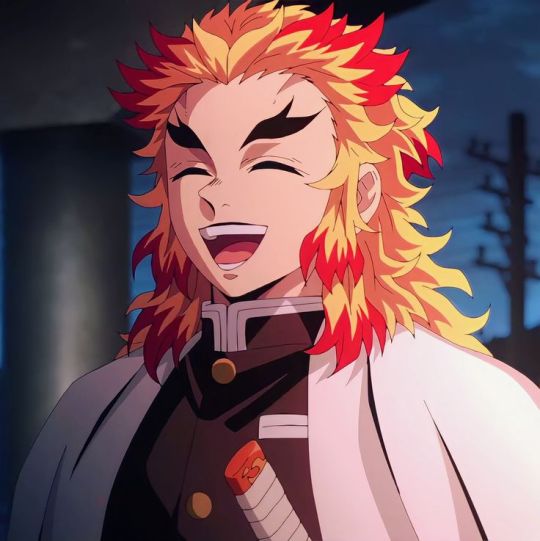
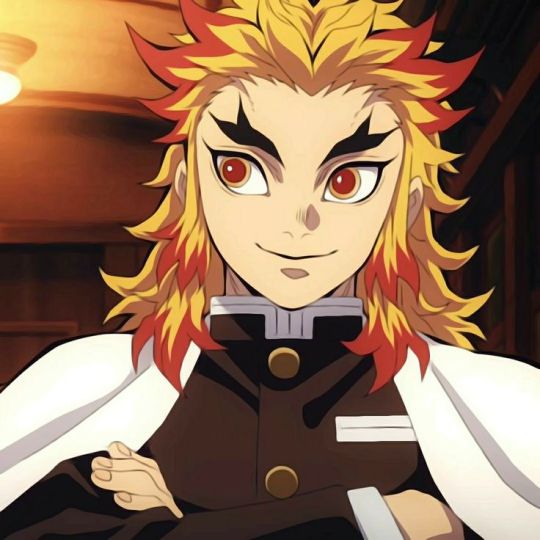
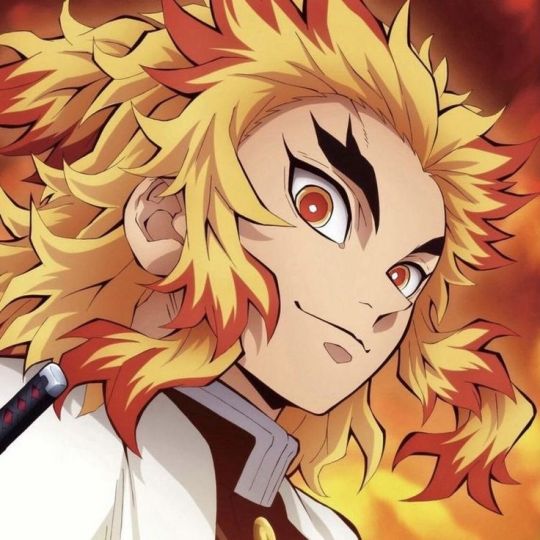

Kyojuro Rengoku x F!Reader
Summary: The Rengoku genes are hard to fight against, but your newborn child finds a way.
Warnings: gendered terms (wife, husband, female, male), reader has just given birth (birth not show), Kyojuro being the supportive man that is his
Word Count: 840+
A/N: First time writing for Kyojuro and I don't know why I haven't before this because I LOVE that man too much. He is one of my many, dearly beloved husbands ✋😩. I hope you all enjoy!
↞ to Masterlists | Request Rules | Blog Navigation ↠

You had pushed out a carbon copy of Kyojuro Rengoku.
You had thought maybe--maybe your genes would stand a chance in the creation of your child.
You thought that maybe the sweet new life you would bring into this world might have your nose or your eyes or even your cheekbones.
You, of course, thought wrong.
You didn’t know why you had hoped so passionately for your child to look like you, not when the entirety of the Rengoku line looked like one person had transported himself through time to live with himself from various different ages.
Bushy and wild yellow hair already grew from your sweet babes head. Bright, red and yellow-rimmed, owl-wide eyes blinked up at you. Pointed nose, high cheekbones, strong grip around your finger, and small but dark eyebrows.
This baby was your husband's clone, just as he and his brother had been clones of their father, and their father a clone of his father.
The one thing you had gifted your baby--the one thing that seemed to have fought tooth and nail through the overwhelming power of Rengoku genealogy had you worrying your lip between your teeth.
Your baby was born female.
Female when generation after generation of Rengoku and Flame Hashira had been male.
You couldn’t help the bit of panic that wound tightly in your chest as you turned your gaze from your baby to your husband, who burst into your room eyes shining and smile so wide you thought the corners might brush the lobe of each ear.
“How is my darling wife?” Kyojuro’s voice boomed through the room, making your midwives cringe and shush him. You, nor it seemed your child, cared. You were used to it, comforted by its consistent optimism, and your baby seemed to feel the same way.
Kyojuro noticed the shushes and whispered an apology back. A whisper that still managed to be projected further than your midwives cared for.
“Sweetheart,” You started as Kyojuro gracefully knelt next to where you sat.
“Yes?” He murmured, softer now that he was leaning closer to gaze upon his baby. You moved her so that you could present her sleeping face to her father.
“The baby…she’s--well she’s a girl.” You heard Kyojuro take a small inhale of breath and your panic spiked. There hadn’t been a single girl in his family for generations. Not one and here you were, giving him a female heir.
You had never known your husband to grow angered. To get mad at you but--maybe this was the line? Maybe it was the line and you were panicking to know what he was thinking.
“Perfect!” He boomed spooking the midwives, some of who gave strangled yelps. “Perfect!” He repeated proudly. “A girl? Are you sure?” He turned to look back at you in his excitement, yellow and red eyes--they were brimming with tears as they looked at you. You felt your own eyes burn in relief. In your utter love for the man kneeling beside you.
“Yes, I’m sure. You’re not mad?” Kyojuro gave a barking laugh at such a thought.
“Mad? No. I’m ecstatic!” You gave your own laugh, your tears spilling from your eyes. Kyojuro brushed his calloused thumb over your cheeks, clearing them both of the racing droplets. “You know there hasn’t been a single female Rengoku since the beginning of our family line.” You nodded, giving a humming “mm-hmm” that caught in your throat, which had tightened painfully in your fear. “Many believed we were divinely blessed for this, but I always felt it was a curse.”
“Do you want to hold her?”
“More than anything.” Kyojuro beamed. You gently passed your baby to her father, her dark brows furrowing at the sudden change.
Kyojuro never once took his eyes off his child. Didn’t stop to brush his own tears away as he took in every last detail of your daughter's face, a look of such love in his eyes it was overwhelming.
“You are special. A good omen.” He whispered down to her. “And I love you. Oh dear--how my heart bursts for you.”
Your own heart felt like it would flutter so hard it would explode right from your chest at the words he gifted his daughter. He was a good man and already a good father.
You brushed your own fingers over his cheeks, clearing them of his tears and running them through his wild hair.
“Want to invite Senjuro in?”
“Only if you wish, dear.” You nodded your head and Kyojuro took a few more, unhurried minutes to hold and watch over his child before passing her back to you. As soon as she was securely within your hold once more, he was popping up to his feet.
“Senjuro!” He called, giving the midwives another frightful start. You watched your husband rush out of the room, lips in a near-painful smile as you chuckled at his excitement. “Senjuro! My baby is a girl! She’s a girl!”
You had been completely foolish to worry.
You and your daughter were in very good and loving hands.
#rengoku kyojuro#rengoku kyojuro x you#rengoku kyojuro x reader#rengoku kyojuro x y/n#rengoku x you#rengoku x reader#rengoku x y/n#kyojuro x you#kyojuro x reader#kyouro x y/n#kny#kny fic#kyojuro fluff#kyojuro fic#demon slayer#demon slayer fic#my fic#dividers by enchanthings
529 notes
·
View notes
Text




The Evermore Grimoire: Greek Mythology
Khaos (Χαεος meaning "Gap" or "Chasm") was the first of the primeval gods to emerge at the creation of the universe in Greek Mythology. Personified as a female, she was the primal feature of the universe, a shadowy realm of mass and energy (mostly negative and dark) within the world that would stem forth in later genealogies. In the beginning, Khaos was all that there was, the dark majesty and mystery of creation incarnate. It was from her that the first three primordial gods sprang forth: Gaia (goddess of earth), Tartarus (the Underworld) and Eros (god of love), the fairest among the deathless gods. Gaia would go on to become the mother of everything beautiful within the world; Khaos however would not be as fortunate. Out of herself, she would give birth to two more children: Erebus (god of darkness) and Nyx (goddess of the night). Their sexual union produced the luminous offspring, Aether (god of the divine air) and Hemera (goddess of the day). However it would her daughter Nyx that would bring fear to the almighty god, Zeus (king of the gods).
artwork by Yliade
430 notes
·
View notes
Text
Personal associations/interpretations of the dark/mystical houses (4th, 6th, 8th, 12th)
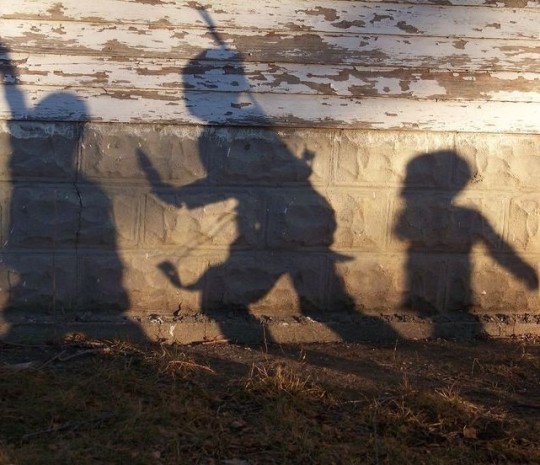
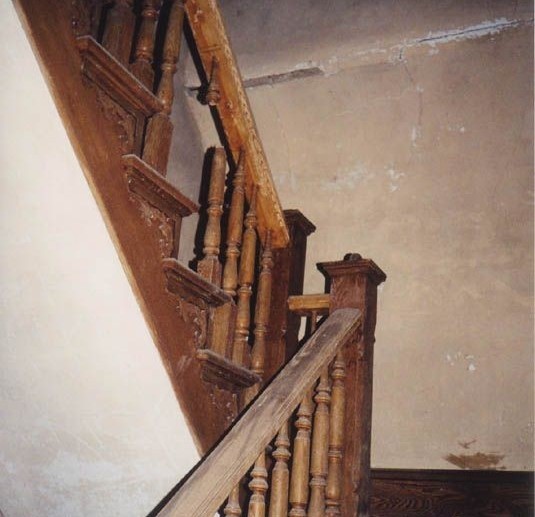
4th house
twisted tree roots, cultural practices, heirlooms, photo albums, inherited features, traditions, the mother, past lives, generational trauma, picture books, garden beds, childhood homes, ancestor altars, hand written recipe books, hearth, squeaky wooden floorboards, genealogy archives, caves, oak trees, baby wrap carriers, emotional security, cultural heritage, building foundations, photo albums, genetics, laundry lines, swing sets, property, mines, crops, sanctuaries, the chest and heart, home steads, fields, farms, root cellars, harvests, pots on stoves, brooms, backyards, agriculture, vines on trellises, handmade blankets, grandparents house, laundry baskets, attachment styles, singing lullabies, history, deep emotions, instincts, the unconscious, summer, waxing moon, vase of flowers, bath time, picking berries, celebrating holidays, chicken coops, older sisters, family gatherings, stone paths, forest walks, ancient structures/buildings, ancestral languages, cupboards, staying in

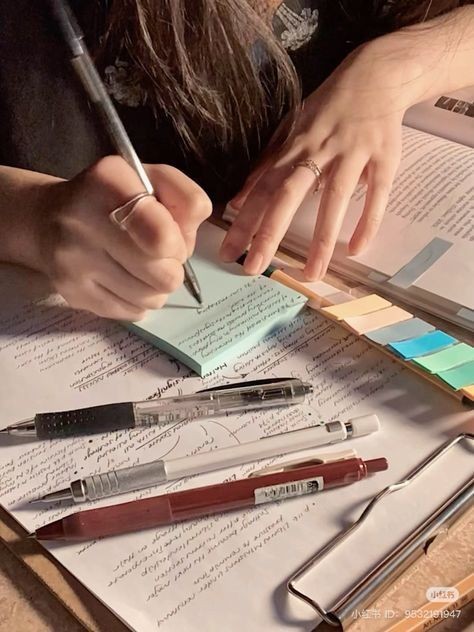
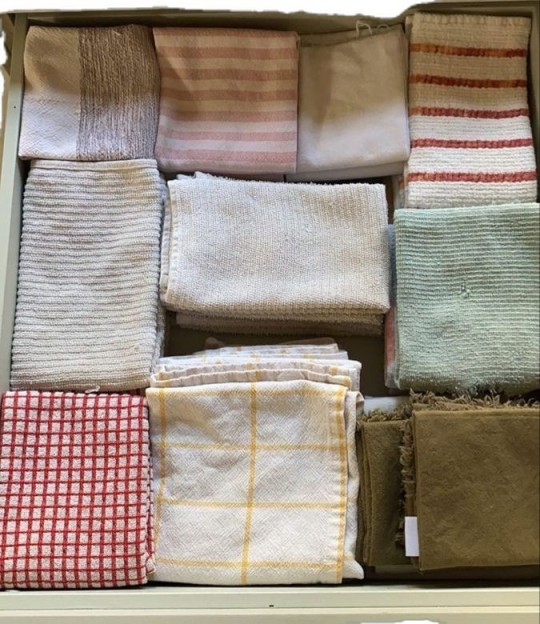
6th house
vitamins and supplements, morning routines, pharmacies, tasks and lists, doctors offices, health food stores, stomach medicine, hygiene practices, journals and planners, schedules, herbal teas, personal rituals, emergency kits, dog walks, lymphatic drainage, caregiving, donating blood, examinations and checkups, meditation, colour coordination, sticky notes, gastrointestinal problems, folded laundry, labels on everything, retirement homes, hand washing, braided hair, herb gardens, filing cabinets, face masks, kombucha, detailed diagrams, volunteer work, medicine cabinets, cleaning supplies, shelves, acts of service, skin care, organic linen, gauze and stitches, stress-induced illnesses, essential oil/herb baths, house plants, instructions, repetition, holistic medicine, giving advice, yoga studios, "gut feeling," bone broth
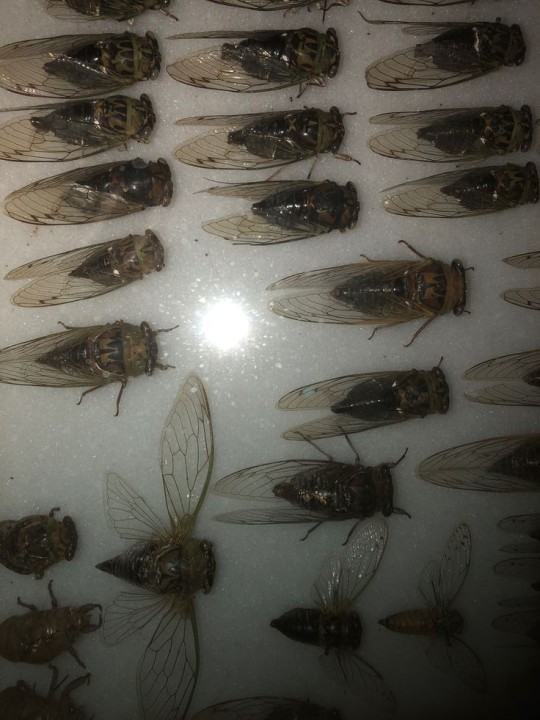
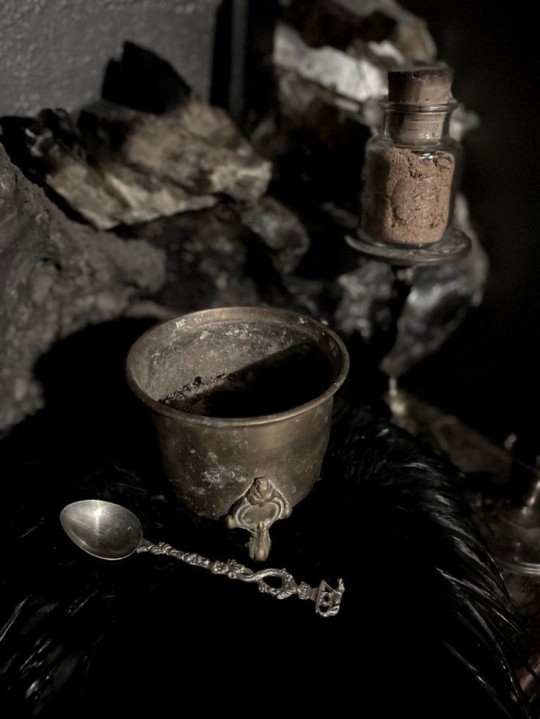
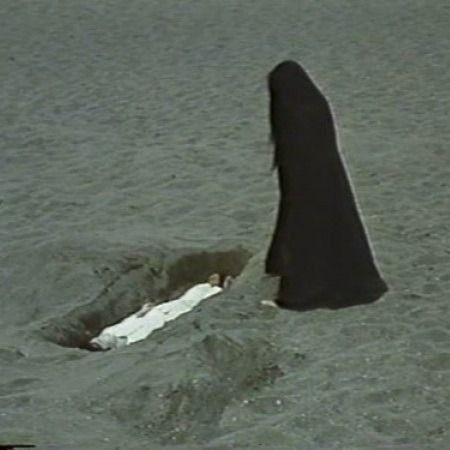
8th house
altars, divination, near death experiences, candle wax, feeling crushed by a heavy weight, grave dirt, red/dim lighting, funerals, double income, control, the underworld, cheques, insurance, heirlooms, ghost sightings, power imbalances, crime documentaries, ouroboros, bank accounts, grief and loss, shadow work, the womb, manipulation, scrying mirrors, Russian nesting dolls, keys, mortuaries, tests from the universe, pendulums, crime scene tape, the phoenix, projections, credit scores, animal bones on a forest floor, blood stained sheets, metaphysical shops, spiritual attacks, deep emotions, snakes, dead flowers, late autumn, wedding veils, envelopes, full moon, muddy boots, shadows at the corners of your vision, scarab beetles, inner processing, experiencing crisis, inherited possessions, natural disasters, sexual trauma, psychological studies, ancestral connections, cracked dolls, veil between realms, mental illnesses, deep connections, intimacy, reincarnation, torture devices, keys, whirlpools, the sound of sirens, unconscious fears, intense first impressions, pushing limits, feeling bound, scratches on walls, ten of swords

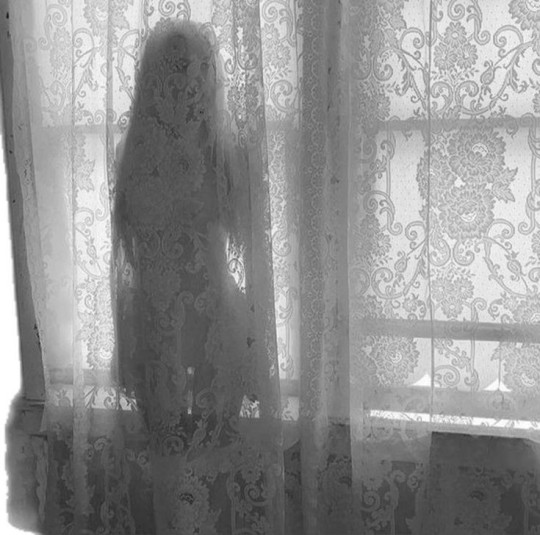
12th house
abandoned places, liminal spaces, long winters, shadowy figures, reoccurring dreams, repeated patterns, fog-filled forests, self analysation, inner worlds, cave systems, unfinished basements, hallucinations, solitary confinement, empty parking garages, spiral staircases, substance abuse, trapped in purgatory, hidden beneath the surface, maladaptive daydreaming, hospital hallways, confines of society, waning moon, moths, wandering aimlessly, disconnection from the world, psych wards, healing others, tired eyes or dark circles, chronic mental illness, suppression, addictions, hiding places, overnight shifts, unexplainable experiences, past life karma, exhaustion, cobwebs, others projections, catacombs, bird cages, premonitions in dreams, prescription bottles, self destructive patterns, late night walks, misty lakes, the feeling of walking out of the movie theater at night, identity crises, blurred faces, empty public transport, astral projection, comas, diary entries, dissociative episodes, shape shifting, generational trauma, observing people, mirrors, padded rooms, the afterlife, chain link fences, paradoxes, feeling misunderstood, repression or memory loss, hikikomori, the freeze response, disappearance, waiting rooms
#astrology#astrology community#astro tumblr#astro notes#astroblr#astrology aesthetic#4th house#6th house#8th house#12th house
249 notes
·
View notes
Text
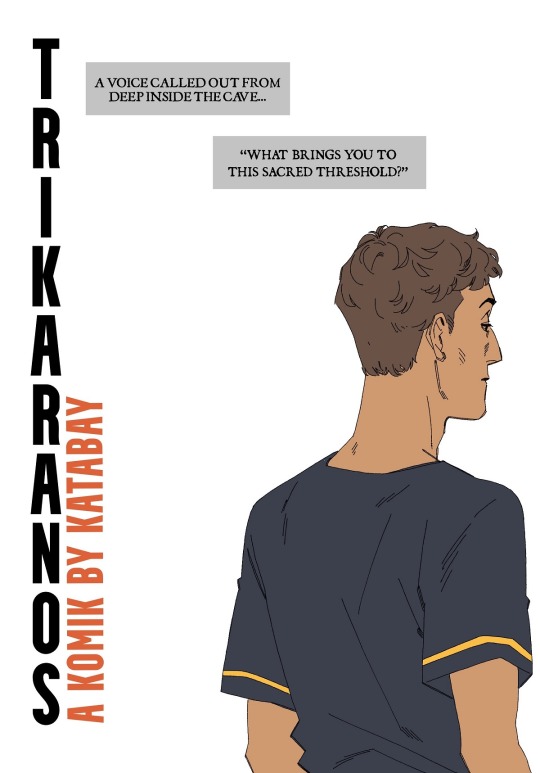
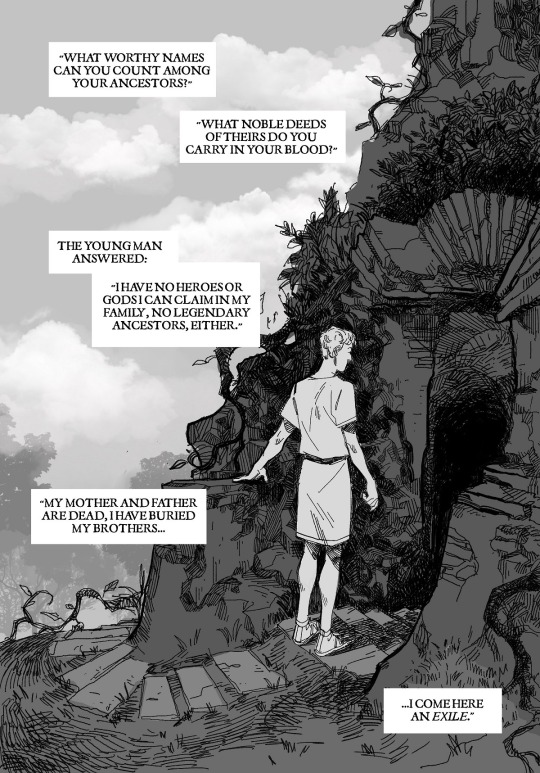
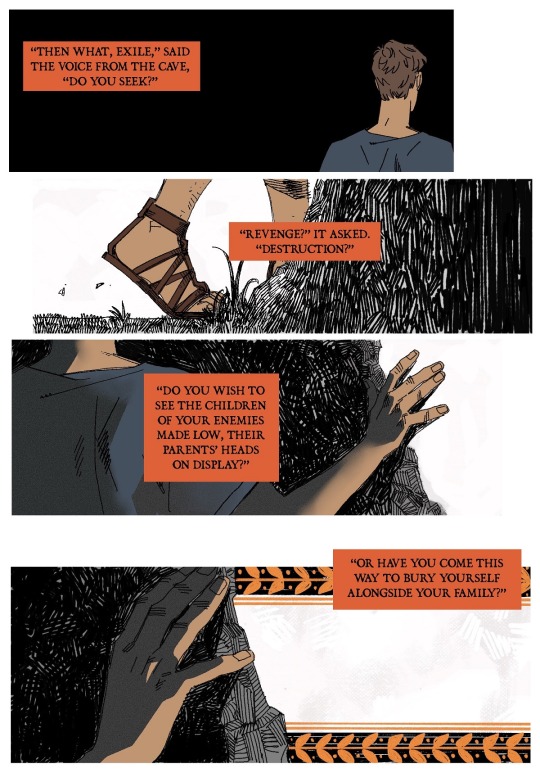
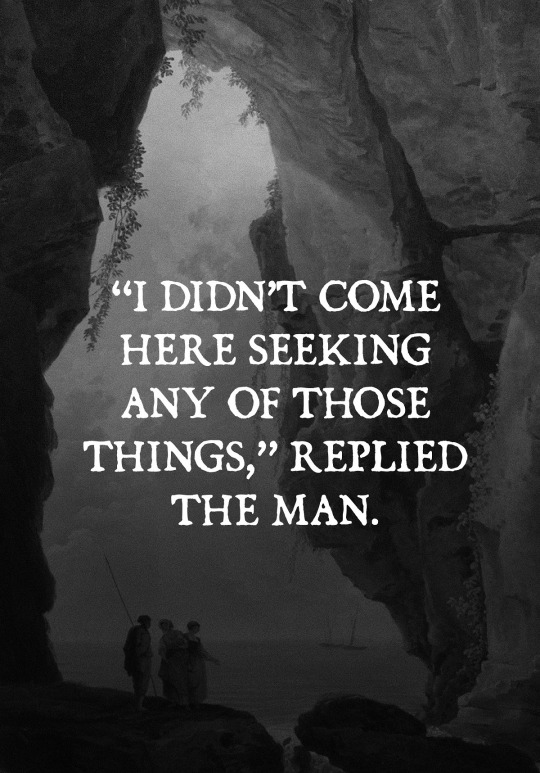
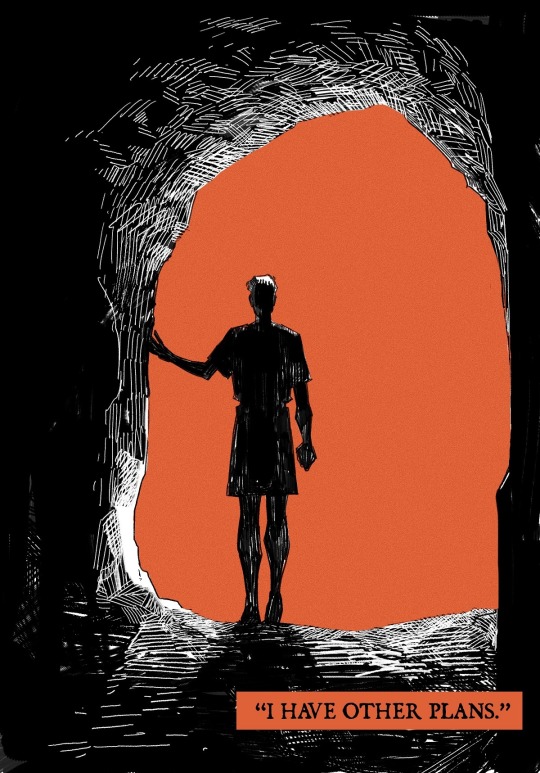
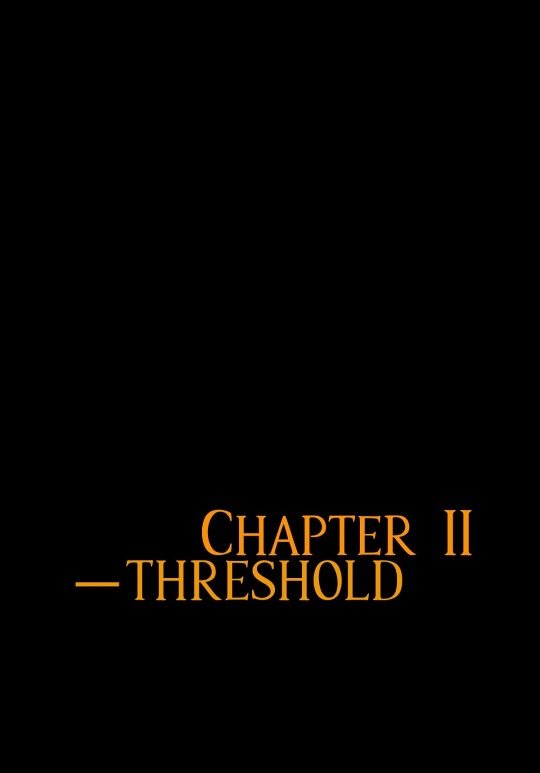
TRIKARANOS CHAPTER II: THRESHOLD (part 1)
TRIKARANOS is a comic about Crassus until it isn't. Intended for an adult audience.
SO! Chapter 2 clocked in at over 20 pages, which means I'll be posting it in batches of like, five or six pages as I finish lettering because trying to format 20 pages in a single photoset is a nightmare and I'm not going to do that lmao
⭐ Trikaranos will always be free to read. In the near future, you’ll have the option to support this comic & my ability to spend time making it through Patreon! currently, I have a tip jar!
⭐ There is no set update schedule (chapters vary in length and will be posted as I finish working on them)
⭐ alternative places to read it (coming soon!)
CREDITS all additional art used are in the public domain, and the specific images used are open access, etc
📌 The Mouth of a Cave, Hubert Robert
📖 PREVIOUS CHAPTER | START HERE | ToC (under construction!)
UNDER THE CUT entirely optional: the creator’s commentary, ancient citations, stuff I thought was neat, etc.
on the topic of legendary ancestors and gods and heroes, T.P. Wiseman's Legendary Genealogies in Late-Republican Rome is a really fun read

also have you ever noticed that caves are fucking weird. like. what's up with caves. however: caves perform the same function as a forest (and a maze)
Nel mezzo del cammin di nostra vita mi ritrovai per una selva oscura, ché la diritta via era smarrita.
-Dante, Divine Comedy
(it's a transformative journey) (a transformative underworld journey, even!)
speaking of which. parents. brothers. oof. can't think too hard about how crassus grew up eating meals with his whole family otherwise I'll feel like I have to walk into the woods and start screaming.


Sophocles’ Antigone (trans. Ruth Fainlight & Robert J. Littman) / Catullus 101 (trans Anne Carson)
391 notes
·
View notes
Text
Hoodoo, Rootwork and Conjure sources by Black Authors
Because you should only ever be learning your ancestral ways from kinfolk. Here's a compilation of some books, videos and podcast episodes I recommend reading and listening to, on customs, traditions, folk tales, songs, spirits and history. As always, use your own critical thinking and spiritual discernment when approaching these sources as with any others.
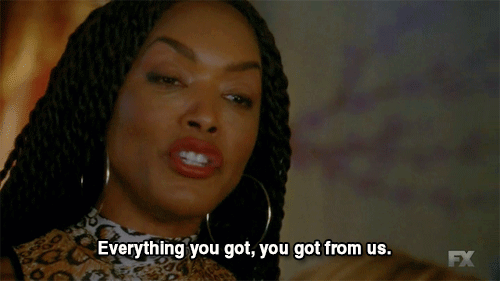
Hoodoo in America by Zora Neale Hurston (1931)
Mules and Men by Zora Neale Hurston (1936)
Tell my horse by Zora Neale Hurston (1938)
Let Nobody Turn Us Around: An African American Anthology by Manning Marable and Leith Mullings, editors (2003)
Black Magic: Religion and the African American Conjuring Tradition by Yvonne P. Chireau (2006)
African American Folk Healing by Stephanie Mitchem (2007)
Hoodoo Medicine: Gullah Herbal Remedies by Faith Mitchell (2011)
Mojo Workin': The Old African American Hoodoo System by Katrina Hazzard-Donald (2012)
Rootwork: Using the Folk Magick of Black America for Love, Money and Success by Tayannah Lee McQuillar (2012)
Talking to the Dead: Religion, Music, and Lived Memory among Gullah/Geechee Women by LeRhonda S. Manigault-Bryant (2014)
Working the Roots: Over 400 Years Of Traditional African American Healing by Michele Elizabeth Lee (2017)
Barracoon: The Story of the Last "Black Cargo" by Zora Neale Hurston (2018)
Jambalaya: The Natural Woman's Book of Personal Charms and Practical Rituals by Luisa Teish (2021)
African American Herbalism: A Practical Guide to Healing Plants and Folk Traditions by Lucretia VanDyke (2022)
youtube
youtube
youtube
youtube
These are just some suggestions but there's many many more!! This is by no means a complete list.
I recommend to avoid authors who downplay the importance of black history or straight out deny how blackness is central to hoodoo. The magic, power and ashé is in the culture and bloodline. You can't separate it from the people. I also recommend avoiding or at the very least taking with a huge grain of salt authors with ties to known appropriators and marketeers, and anyone who propagates revisionist history or rather denies historical facts and spreads harmful conspiracy theories. Sadly, that includes some black authors, particularly those who learnt from, and even praise, white appropriators undermining hoodoo and other african and african diasporic traditions. Be careful who you get your information from. Keeping things traditional means honoring real history and truth.
Let me also give you a last but very important reminder: the best teachings you'll ever get are going to come from the mouths of your own blood. Not a book or anything on the internet. They may choose to put certain people and things in your path to help you or point you in the right direction, but each lineage is different and you have to honor your own. Talk to your family members, to the Elders in your community, learn your genealogy, divine before moving forwards, talk to your dead, acknowledge your people and they'll acknowledge you and guide you to where you need to be.
May this be of service and may your ancestors and spirits bless you and yours 🕯️💀
#hoodoo#conjure#rootwork#black hoodoo authors#Youtube#hoodoo books#african american conjure#african american history#black history#black folklore#african american folklore#black magic#african american magic#witches of color#ATRs#Spotify
1K notes
·
View notes
Text
Aredhel and Turgon:
Civilization vs. Wilderness

It’s apparent that Aredhel is partly inspired by Artemis, virgin Greek goddess of wilderness, hunting, and moon (or twilight) — and right down to her fiery will.
I’m probably late to the party, but while listening to a doc on the history of poetry, it dawned on me: Tolkien partly based Turgon on Apollo — Greco-Roman god of art, music, and poetry.
The connection is not readily intuitive since Turgon isn’t explicitly characterized as a patron of fine arts. However, civilizations have been based, to an extraordinary degree, on verse. Language creates shared awareness and memory through oral history, genealogy, religious hymns, lore, and law, etc.
In essence, Apollo’s arts are the cornerstones of civilization.
Ancient Greeks had the Odyssey, Euripides, and Sophocles. Chinese civilization is based on the Confucian anthology. For the Hebrews, it was the psalms and prophets of the Old Testament. Hindus relied on the Verdic texts. In the same vein, exiled Noldor civilization is based on the Quenta Silmarillion.
Turgon’s “song” within the Music is that of a “founding father”, so to speak. Hence he is said to have erected Middle Earth’s first stone building (arts as “cornerstones” of civilization, get it?).
Furthermore, Turgon’s kingdom of Gondolin houses the great loremaster Pengolodh. Drawing from from first-hand accounts, verse and song, it from he whom we learn of Silmarils, War of Wrath, Rings of Power, — the tragic fates of Gondolin, Turgon, and Aredhel.
Apollo/Turgon and Artemis/Aredhel: two sides of the same coin
As fraternal twins, Artemis is the moon and night whereas Apollo is the light and day. Their opposites symbolize the duality of mankind through divine expression. Apollo represents reason and order while Artemis signifies the more untamed aspects of our nature.
The friction between Turgon and Aredhel has mainly parallels the myth of Apollo and Artemis.
57 notes
·
View notes
Photo

Britomartis
Britomartis, also known as Diktynna (Dictynna), was the Cretan goddess of hunting and fishing nets in Greek mythology. Although referred to as a nymph and worshipped locally, she had at least two significant and active shrines, one in Crete and another in Aigina, where worshippers would bring offerings. They regarded her as a vanished maiden immortalized and deified by Artemis.
According to her most popular myth, Britomartis, meaning "sweet maiden," was an exceptional huntress and a beloved companion of Artemis. As such, she had vowed to remain a virgin. Nevertheless, King Minos desired her and relentlessly pursued her for nine months. He eventually caught her atop a high peak and attempted to seize her, but Britomartis leaped from the cliff into the sea to escape. She was recovered by fishermen's nets (diktuon) and brought to the island of Aigina. There, Artemis transformed her into the goddess of the nets, Diktynna, to preside over her own cult.
Despite her clear Cretan origins, Britomartis/Diktynna was likely a minor goddess who was reintroduced into the Bronze Age pantheon of the island by Classical Greek writers. Over time, Diktynna came to be associated with divine genealogies and was even included among the children of Leda by Zeus, Apollo and Artemis. Her cult remained popular throughout the Hellenistic and Roman Imperial periods, as evidenced by the archaeological remains of her sanctuaries and the coins bearing her image.
In Minoan Religion
The Cretan system of sacred beliefs and practices is marked by impressive processions, bountiful sacrifices and offerings, mystery symbols such as the double-axe (labrys), and ritual activities such as bull-leaping. It also features painted and sculpted images of female characters commonly interpreted as goddesses or priestesses, most typically with raised arms. Some of these goddesses/priestesses are shown holding snakes, which led Sir Arthur Evans (1851-1941), the key figure in the discovery of the Minoan civilization, to suggest they may represent a 'Great Mother Goddess' and her fellow associates.
The discovery of numerous inscriptions at Knossos, an archaeological site he believed to be King Minos' palace, convinced Evans that deciphering these inscriptions would reveal a clear understanding of his material finds and their significance in the Minoan religion and culture. He dedicated his life to this effort, only to find that the inscriptions represented three different scripts: Cretan Hieroglyphs, Linear A, and Linear B. While the first two scripts remain undecoded, the Linear B script was eventually deciphered by Michael Ventris (1922-1956). As nearly all the tablets read since then contain administrative and commercial records, understanding the Minoan religion has largely remained dependent on drawing parallels between pieces of visual evidence from art, archaeology, and architecture. In other words, we have no written evidence yet that can directly tell us what the Minoans used to call their goddess or goddesses.
Minoan Snake Goddess, Knossos.
Mark Cartwright (CC BY-NC-SA)
Still, there is a foundational agreement among the scholars that the Minoan religion, like many other aspects of this culture, was later adopted or adapted by the Mycenaeans and Greeks. Just as Michael Ventris demonstrated that the language of Linear B inscriptions is an early form of Classical Greek, scholars such as Jennifer Larson explain that
From its beginnings in the Bronze Age, “Greek” religion was a synthesis. The strong influence of Minoan ideas and aesthetics is clearly discernible in the material culture of Mycenaean religion…
(138)
The idea of the persisting prominence of several gods and goddesses such as Zeus, Apollo, Dionysus, and Athena from the Minoan down to the Mycenaean and Greco-Roman cultures finds material support in the names of these deities on a few Linear B tablets. These tablets were discovered at the Palace of Nestor in the Mycenaean city of Pylos, c. 1200 BCE. The tablets list the offerings and sacrifices that were dedicated, or must be dedicated, to each deity. On one tablet, Tn 316, the divine recipients of gold vessels include Zeus, Hermes, Hera, and Potnia. The name Potnia, written as po-ti-ni-ja in Linear B, means "The Female God Who Has Power." This title was given to several important goddesses in Minoan Crete, sometimes as an epithet, e.g. Potnia Athena, sometimes denoting the geographical or functional attribute of the goddess, e.g. Potnia Hippia (Mistress of the Horses), and sometimes solely as her name or title. If we trust that Potnia must be the Minoan/Mycenaean designation for sacred female figures in the Minoan art because they are both noticeably frequent, then it is likely that this Minoan/Mycenaean great goddess survived the Bronze Age Collapse and made her way into the Archaic Greek pantheon in the form of one or more female deities.
Since the Bronze Age goddess was often featured concerning warfare and protection, most scholars suggest that Athena is the Greek revival of Potnia. Nevertheless, the Cretan goddess, who was consistently honoured and praised by Greek writers from the 5th century BCE onwards, was Britomartis/Diktynna. And she was explicitly linked to Artemis and, later, to her divine family.
Minoan Gold Signet Ring with Three Figures before a Temple
Nathalie Choubineh (CC BY-NC-SA)
Continue reading...
34 notes
·
View notes
Text
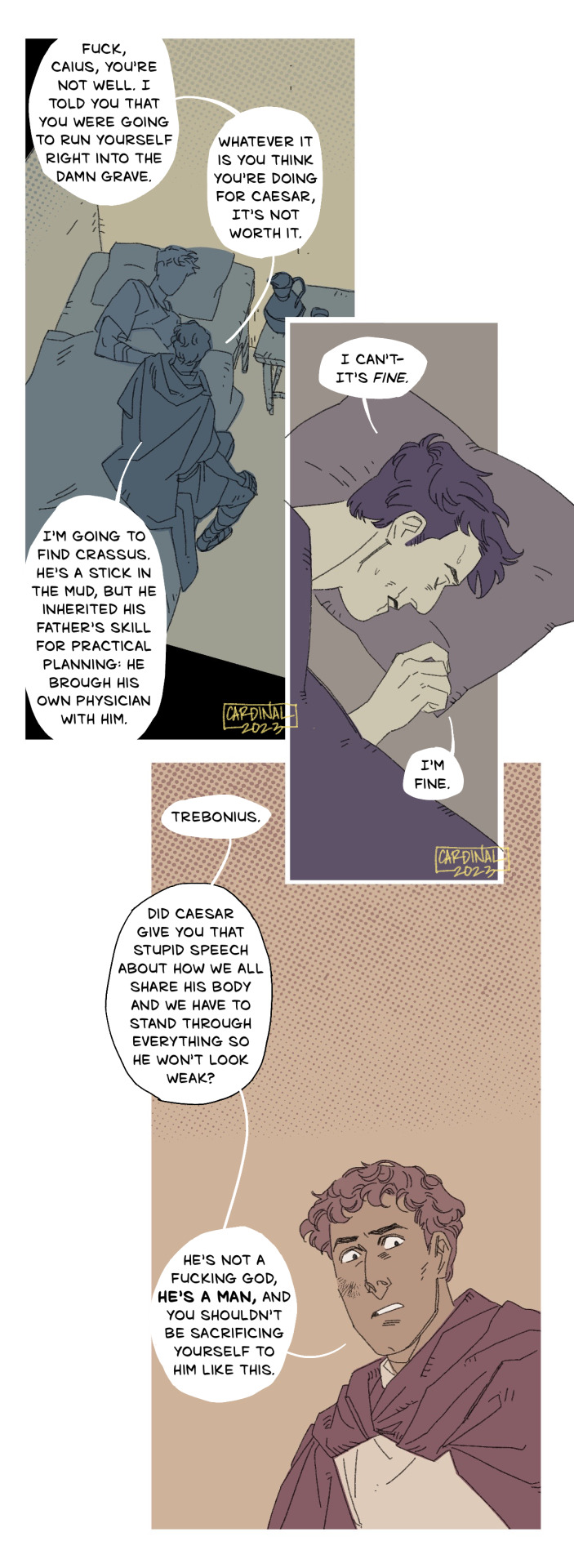
ANTONY: if Caesar doesn't set Sextius Baculus up in a house worthy of Lucullus for all that he did, I'll kill him myself.
so the fun thing about the Caesarians is that there is. weird stuff happening in there. a lot of focus seems to go towards non Caesarian dissent, specifically with the conspiracy of Cassius and Brutus, but there's like. stuff going on in Caesar's own camp that's very Intriguing.
There's a couple places where you can see some clear points that would be grounds for a conspiratorial falling out between Caesar and Trebonius, but from the way that Trebonius tries to seduce Antony over to conspiracy, I wonder if there was a secret third thing that was going on since Antony turned him down but. didn't snitch intriguing!
anyway, all of this is to say that this means I get to invent some shit. like, I'm drawing comics which is already invention, but this is one where I get to really start throwing stuff into the narrative soup because it has to set up three different character arcs (Trebonius, and then Antony twice)
(in theory, this would be explained in the story itself if I did the entirety of the Gallic Wars out as a comic. which I have not done because I do not want to draw horses. I wanted to fuck around with some panel layouts and not draw a single horse, so now I will provide the context and revisit this in the future)
Antony's comment about Trebonius running himself into a grave has to do with the Caesar's Gallic Wars have a lot of men doing a whole lot for Caesar that has me going. hey. hey guys. uh.
specifically, Sextius Baculus:
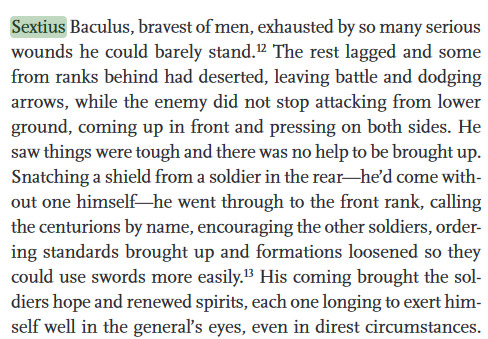
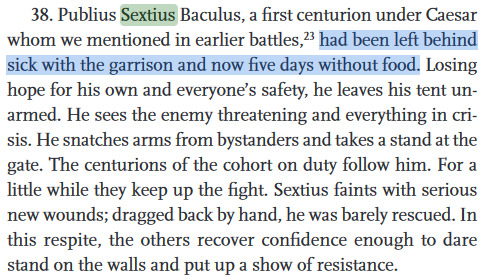
The War for Gaul, Julius Caesar (trans James J. O'Donnell)
and the closing comment from Antony is playing on several things: romans claiming gods on their family tree (see: Legendary Genealogies in Late-Republican Rome, T.P. Wiseman for more on this) and then divinization arc of Caesar and Octavian. Antony himself will later be taking part the same kind of god-association that has prompted his disdain in this scene
At any rate, when Antony made his entry into Ephesus, women arrayed like Bacchanals, and men and boys like Satyrs and Pans, led the way before him, and the city was full of ivy and thyrsus-wands and harps and pipes and flutes, the people hailing him as Dionysus Giver of Joy and Beneficent. For he was such, undoubtedly, to some; but to the greater part he was Dionysus Carnivorous and Savage.
Plutarch, Antony 24
and the second layer of thematic fun: Antony's later relationship with his soldiers is something similar to what Caesar had with his here, but ultimately: decayed. Antony's love affair with his military makes his failure to lead well at the end a worse betrayal. at some point I'll talk about Antony's Tormentous Military Nightmare and cite some academic sources, but Linda Bamber's description of the final tragedy of Antony and his men lives in my head rent free

Cleopatra and Antony, Linda Bamber
where's the fun in doing identity focused tragedy if you don't become unrecognizable to yourself later on! isn't that right mark antony
ko-fi⭐ bsky ⭐ pixiv ⭐ pillowfort ⭐ cohost ⭐ cara.app
#gaius trebonius#mark antony#man. this explanation for the scene. is longer than the three panels.#anyway i changed my mind about how trebonius gets his eyebrow scar. he gets it during his Fight with caelius#oh! the crassus mentioned here is the eldest son! sure hope something bad doesn't happen like his father and brother dying haha ha h--#(head in hands)#long post#komiks tag#drawing tag#roman republic tag#anyway. i need to. i need to get my sketch book. this book i was reading called trebonius a pro cassian commander#and im fucking. losing my mind about that. oh my god.
198 notes
·
View notes
Text
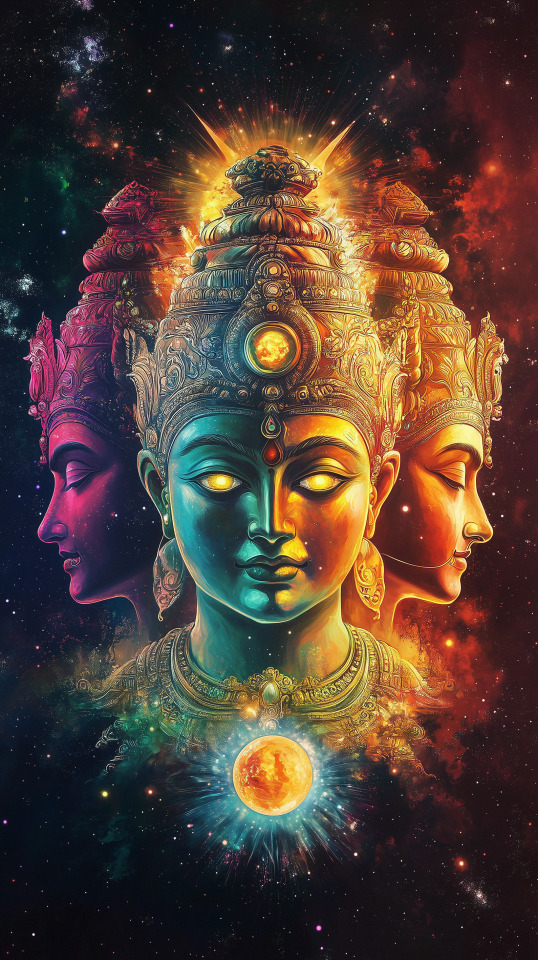

Cosmic Trinity Talon Abraxas Hari Om Mantra: Hari Om Tat Sat - God is the Supreme Reality. Hari Om Soham - God I AM, I AM God. Hari Om Sat Nam - God is my True Self.
The Vedas are the main and intrinsic part of the Hindu mythology. Hindu mythology roots back to 7200 BC when the first hymns of the RIG VEDA was composed. There is no systematic theology in the Vedas. The hymns of the RIG VEDA are the first and freshest expression of the sense of beauty and gladness awakened in the Aryan race by the charms and the bounty of nature. The gods of the Vedas are in their apparent origin no more than the poetic epithets of space, the heavens, the firmament, sun and earth, day and night, twilight and dawn, wind and rain, storm and sunshine; all ministering to the divine care of man, in the breathing air and radiant light, the fleeting moon and constant stars, the rising mists and falling dews and the rivers which flow down the hills through the fruitful plains making with the flocks and herds and woods and fields, one ceaseless voice of praise and adoration. The etymological meaning of the epithets is so clear that it at once explains the myths, which, in the course of time became attached to them. Thus the VEDAS mirror the exactly how the words uttered centuries ago by the Vedic RISHIS (bards) and sages gradually became the gods of India. VEDIC GODS assumed the most undoubted personality, of the real qualities intended to be expressed by their names. They have no fixed hierarchy, or regular genealogy, no settled marriages and relationships; they remain to the last transparent reflections of those physical phenomena and powers of which they are the earliest known appellations. They were mere abstractions, intangible and illusive personification of powers of Nature. It is only in the Puranas that they become invested with strong personality, and it is their order among the Puranic gods that the conventional representation of them in the later mythology of the Hindus was more appropriately described. Rig Veda - lore of the verses, enumerates numerous Vedic Gods. The earliest accepted Gods were DYAUSH PITA (the sky father), PRITHVI MATHA (the earth mother), VAYU(the wind God), PARJANYA (the rain God), SURYA (the sun God), VARUNA (the God of oceans), AGNI (the fire God), INDRA (the war God), SOMA (the God of speech, deity of soma creeper), USHAS (the Goddess of dawn), YAMA (the God of death), ADITYAS (a group of deities, who are six in number in the Rig Veda, eight in most of the Brahmanas and twelve in the Satapatha Brahmana), ASWINI (twin Deities), RUDRAS (eight in number), VASUS (eight in number) and VISVEDEVAS ( ten in number). Vedic priests believed in ceremonies and rituals, which were offered to appease these Gods. No one Vedic God has been considered the Supreme God. In fact, different Gods have been considered as Supreme at different times, attributing the powers and qualities of one to another. Apart from Gods who have been attributed specific characteristics, several inanimate objects, qualities, emotions and various forms of nature had also been deified and worshipped. What began as a celebration of natural elements such as Air, Water and Fire was converted into the worship of cosmic elements such as the sun, moon and stars. And thus formed the triad of the early VEDIC GODS - AGNI (god of fire), VAYU (god of air) and SURYA (god of energy or life) - THE COSMIC TRINITY. These were all sons of PRITHVI (Mother nature) and DYAUS (the sky). In addition to this the nine planets (NAVAGRAHA) were also worshipped.
24 notes
·
View notes
Text
thinking about debbie grayson having to insist to both her husband and her son that regular nonsuperpowered human beings (read: her) have important, meaningful lives and experiences, and how heroic epics like the iliad only trace genealogies down the patrilineal line, this conflation of divinity and masculinity and power that erases the women of these families from historical memory and narrative importance
#bolo liveblogs#invincible#it's not the same with debbie of course because the narrative very much refuses to let her be a discarded mother but#that's the pressure she's facing both in- and out-of-story.#anyway I know *some* spoilers for invincible but not all of them and#I would give my kingdom for mark's rejection of nolan's alien/white/imperialist lineage to come with an embrace of#his human/asian heritage from debbie. I just think it'd be neat
40 notes
·
View notes
Text
At the moment, I'm reading the Penguin Classics edition of the so-called Apocryphal Gospels, edited by Simon Gathercole. Specifically, I'm on the Gospel of Marcion, an influential second-century thinker who saw the vengeful God of the Old Testament and the merciful God of the New as separate deities, implacably opposed to one another. Marcion produced his own, heavily edited version of Luke's Gospel, stripping out all references to Jesus' Davidic genealogy and human relatives, as well as any mentions of divine judgment. My training is as a classicist, not as a scholar of early Christianity, so much of this is terra incognita for me. But hey, if one is never willing to learn new things, one will never grow as a person, am I right?
25 notes
·
View notes